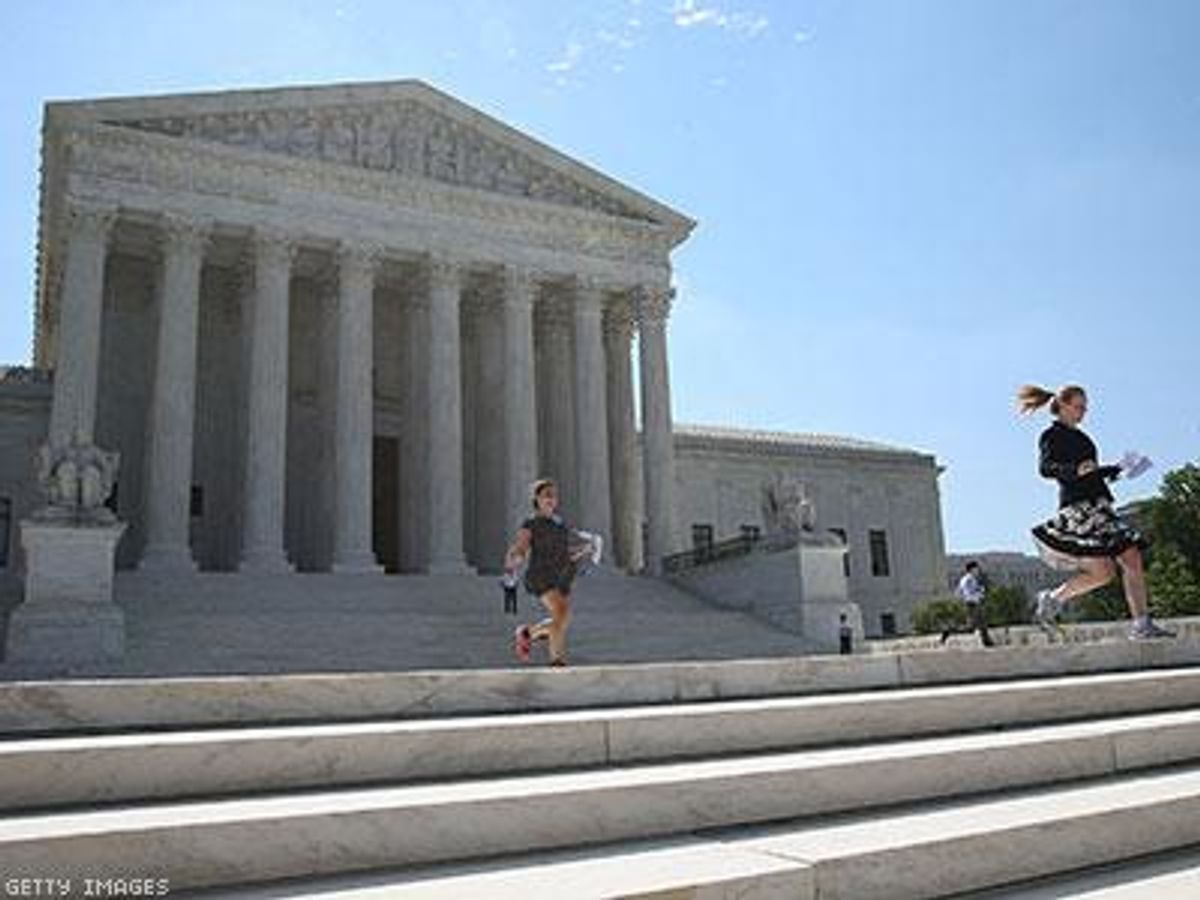The U.S. Supreme Court handed two huge victories today to President Obama, civil rights groups, and affordable health care advocates, and a double defeat for corporate interests, conservatives, bankers and Obamacare opponents.
In one of the rulings, the justices decided 5 to 4 that claims of racial discrimination in housing cases shouldn't be limited by questions of intent and can be based on disproportionate "adverse impact" on any group based on race, national origin, color, religion, sex, familial status, or disability.
Bloomberg reported the decision was a "blow to lenders and insurers and a surprise legal victory for the Obama Administration."
In this case, the court affirmed an appellate court decision involving a nonprofit group, the Inclusive Communities Project, which said that the Texas Department of Housing and Community Affairs had contributed to "segregated housing patterns by allocating too many tax credits to housing in predominantly black inner-city areas and too few in predominantly white suburban neighborhoods."
The ruling settled the issue of "disparate impact" in housing cases, meaning that statistics and other evidence can be used to show decisions and practices have discriminatory effects -- without proving that they're the result of discriminatory intentions, as National Public Radio's Carrie Johnson noted.
"Justice Anthony Kennedy surprised many legal experts by siding with the court's four liberals. Business groups had long sought to limit lawsuits over the 1968 Fair Housing Act."
LGBT advocates, including Rea Carey, the executive director of the National LGBTQ Task Force, cheered the decision, saying, "Today's rulings are crucial victories for heath care and fair housing."
"The Court's ruling will not only continue to protect millions of Americans, but it also upholds the important principle that, as a nation, we value the diversity of the communities in which we live, especially at a key moment for racial justice in America. Now that the Court has reaffirmed this vital principle, it's time to fully implement it throughout the nation. We look forward to working with HUD and other policymakers to banish racial and other housing discrimination practices and collectively build a nation of affordable, safe and welcoming neighborhoods for all."
Also today, the Supreme Court rendered a decision that provided a sweeping victory for President Obama's Affordable Care Act upholding a key provision of what is popularly known as Obamacare -- that government subsidies that now make health care affordable for millions of Americans should be available to all.
The vote by the nine justices was 6 to 3, affirming the ruling by the Internal Revenue Service that subsidies should be available not just in the states that have established their own health insurance exchanges, but also in those states where the federal government exchange is the means for consumers to find coverage.
This was the second attempt by opponents of Obamacare to have the high court overturn the president's most significant legislative achievement, and likely not the last as more challenges await. But as The Washington Post noted, "an adverse ruling in this case would have been close to a mortal blow to the act that continues to divide the nation and its political conversation."
President Obama himself stopped just short of declaring "I won!" in a Rose Garden statement he delivered fewer than two hours after the Supreme Court handed down its opinion.
"Today after more than 50 votes in Congress to repeal or weaken this law, after a presidential election based in part on preserving or repealing this law, after multiple challenges to this law before the Supreme Court, the Affordable Care act is here to stay."
Carey, of the Task Force, called both rulings by the high court "crucial victories for heath care and fair housing."
"In a 6-3 decision on King v. Burwell, the Court ruled in favor of the government, holding that the correct reading of the Affordable Care Act makes tax credits available to individuals, regardless of whether they are enrolled in a state-established or federally-established exchange. The Affordable Care Act is absolutely critical in providing access to affordable quality health care. Greater access can help us address the significant health disparities in the LGBTQ community."
Chris Cillizza wrote in the Post, "The simple truth is that this was widely regarded as the last, best chance to knock the law down in a meaningful way. "
House Speaker John Boehner, a Republican from Ohio, was unmoved. "We will continue our efforts to repeal the law and replace it," he said at a press briefing. And he tweeted:
Conservative writer Matt K. Lewis bemoaned how upsetting the decision was and wrote that the fault lie not in the Republicans' efforts but in Chief Justice John Roberts:
"The irony here isn't that a Republican-appointed Supreme Court chief justice has twice preserved the landmark legislation of Barack Obama. The irony -- and heartache, for conservatives -- is that on both occasions, Roberts has had to employ judicial gymnastics to rationalize his decision. In the King v. Burwell decision, Roberts chose to ignore the letter of the law -- no matter how specious or unintentional the letter may have been -- and instead, divine the law's intent."
Karen Tumulty wrote in the Post that privately, GOP leaders were breathing a sigh of relief.
"Had the court gone the other way, Republicans would have faced their most serious governing challenge since taking control of both houses of Congress earlier this year.
"Former Republican National Committee chairman Ed Gillespie called it 'a bad legal outcome, but a good political outcome' for Republicans. But he added that it will increase pressure on his party to come up with a specific alternative to the law ahead of the 2016 elections."
Rush Limbaugh didn't spare his vitriol in reacting to the ruling, calling it "an absolute disaster" on his radio program.
You can listen to Limbaugh's comments below, as well as Speaker John Boehner's briefing to the media and President Obama's Rose Garden announcement.


















































































Viral post saying Republicans 'have two daddies now' has MAGA hot and bothered